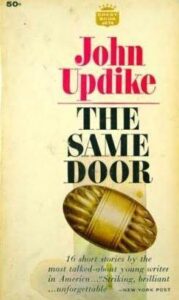The Same Door by John Updike 1959
I was quite saddened when John Updike died in 2009 at the age of 77. I had read many of his books from the five volume Rabbit series which won two Pulitzers (Updike is one of only four writers to win two Pulitzers for fiction), to his short stories (more than 180 of them published primarily in The New Yorker and collected into 18 volumes including two by the Library of America), from his poetry (eight volumes) to his literary and art criticism. He was, in many ways, the primary author of my reading life in my middle years.
So when I decided to read a volume of his short stories this month, I chose to start at the very beginning (to quote Julie Andrews) and read ‘The Same Door’, his initial collection of 16 stories published 65 years ago. Sadly, I was disappointed and had to work hard to get through all of them.
Most of the stories were set in Updike’s favorite territory, small town Pennsylvania, specifically Olinger, and were peopled by ‘middle class Protestants’ as Updike described the focus of his stories. The characters were experiencing the stress of jobs, money, family, or adultery or all of them at once. The stories, unlike Philip Roth’s initial volume ‘Goodbye, Columbus’ felt overwritten with too many adjectives piling up in most sentences as in this description of a minor character in ‘Toward Evening’: “When she recrossed her legs, he noticed the unpatterned breadth of turquoise skirt, the tense hair painfully pulled straight, the hard-to-read foreshortened curves of her face, the hands folded with an odd precision in her turquoise lap.” Four adjectives and an adverb in one sentence seemed overdone and this pattern persisted through all the stories.
And then there was for me the issue of the characters who, again in contrast to Roth’s Jews, I had difficulty identifying with and feeling compassion for.
I wanted to like these stories but I didn’t. In trying to understand why, I applied the five rules of literary criticism that Updike specified in his 1975 collection of literary criticism, “Picked up Pieces” as follows:
1. Try to understand what the author wished to do, and do not blame him for not achieving what he did not attempt. (Updike never claimed to be writing about the ‘universal’. Rather he set out to write about ‘middle class Protestants in small towns’. and, to his credit, these stories did that well.)
2. Give enough direct quotation—at least one extended passage—of the book’s prose so the review’s reader can form his own impression, can get his own taste. (See the above sentence filled with unnecessary adjectives and adverbs.)
3. Confirm your description of the book with quotation from the book, if only phrase-long, rather than proceeding by fuzzy précis.
4. Go easy on plot summary, and do not give away the ending.
5. If the book is judged deficient, cite a successful example along the same lines, from the author’s œuvre or elsewhere. Try to understand the failure. Sure it’s his and not yours? (The ‘failure’ in this case is probably shared between my expectations and Updike’s youthful writing and won’t put me off reading more of his later work.)
So, I’ll stand by my criticism though temper it by citing the fact that Updike did accomplish his primary goal. In this initial effort at the age of 27, however, he was still honing his skills and for that one can hardly criticize him. I look forward to reading his more mature work in the coming days. He remains one of my all time favorite writers. I still miss his nearly annual publication of a new book.



